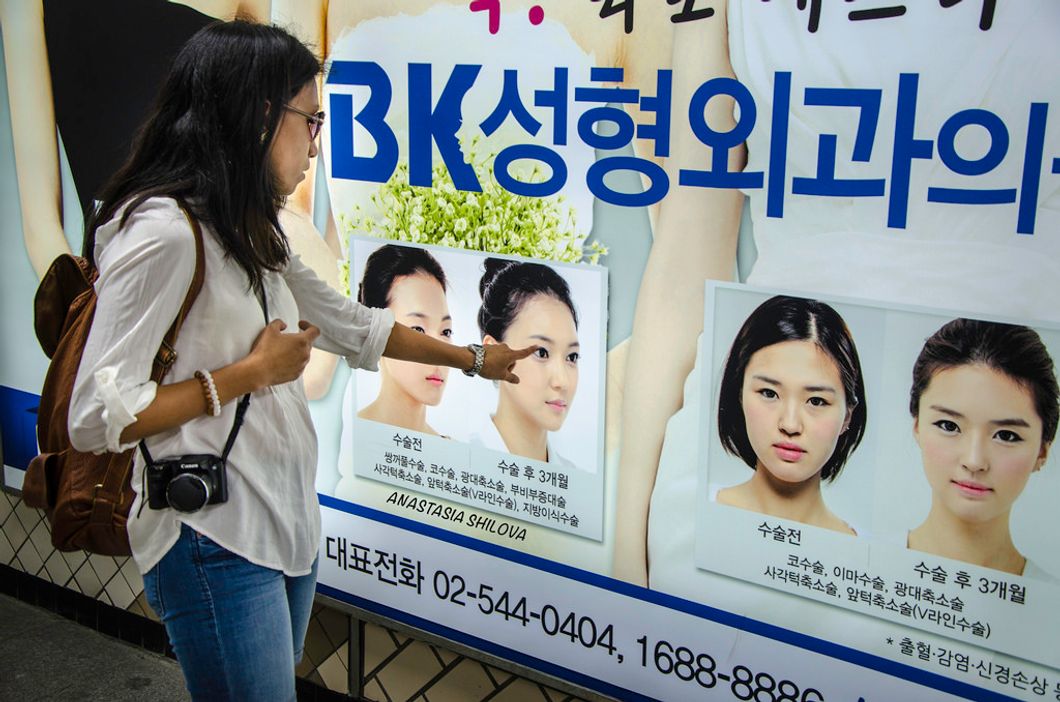The portrayal of oneself is one concern that is rooted deeply in society. Of course, it is a major determinant of how we carry ourselves, so the attention is expected. Yet despite its importance, it has become a luxury to most, regardless of whether you've let yourself go after discovering that noodles are cheaper than a fresh avocado salad, or you are still shopping at overpriced health stores.
Being healthy and good looking (which are not always the same thing) does not come for free. Health food and market products are pricey compared to unhealthy, processed, less nutritious products. Ironically enough, the weight-loss industry is valued at billions of dollars each year.
Whether it is the promise of a magical pill or constant attention from a trainer, weight-loss requires a financial commitment, as well as additional physical self-confidence issues. But because it directly relates to our bodies, instead of being an external product, it's important to consider whether these industries and products really do have a healthy impact on our lives.
The commercialization of weight-loss, exercise, and health food is, for one thing, problematic, because as concepts like body positivity gain popularity among people opposing rigid standards of beauty, the advertising and discussion of body-related issues require careful consideration.
Take, for example, advertisements like Dove's 2006 "Campaign For Real Beauty," which presented a diverse set of body types. It was an example of a company navigating within a politically correct discourse while still convincing people that they needed their product to feel better about themselves. And while it may have had less harmful effects on self-confidence than other advertisements, it remains unclear whether it really reflects a lasting change in norms.
A less successful example can be found in Protein World, a brand specializing in workout and weight-loss supplements, as its name implies. Summer 2015 they came under fire for their advertisement posters of women in beachwear, which awaited passengers of the London Underground, asking the question, "Are you beach-body ready?" This is most likely a familiar question to most, but that did not lessen the public's discontent towards the ad's obvious disregard for body positivity. All in all, its underlying message was interpreted as being "fat-shaming."
True, it may not have been the best choice of words, but in Protein World's defense, talk of a "summer body" is common, whether in magazines, during dinner with friends, or even in your own mind, as you pep-talk yourself out of buying that extra donut. But although we might be thinking about it, we apparently do not appreciate the reminder. Protein World made another attempt a year later, featuring an airbrushed Khloe Kardashian with the rather predictable "Can you keep up with a Kardashian?"
People were not impressed with their new attempt; people are getting tired of unrealistic expectations, so heavily photoshopped ads encouraging us to change our bodies is increasingly being seen as morally unacceptable. That being said, this begs the question: how should these types of products be advertised? If we look at other types of advertisements, they all try to make us want something, or maliciously convince us that we need a specific product or service in order to feel better about ourselves and succeed in life.
If weight-loss ads are supposedly exposing us to unhealthy body issues, then shouldn't ads for junk food, that persuade us to consume unhealthy, possibly addictive meals, also be similarly shunned? And shouldn't that apply to makeup and skincare products which also suggest that we have physical flaws that can be improved through a commercial transaction. All marketing strategies target insecurities or something unfulfilled in our lives that their product offers a solution for. So why the selective outrage?
It's important to recognize the cultural differences to ad sensitivity. Whereas Londoners were so outraged that they asked Sadiq Khan, the mayor of London, to ban these types of ads from the Tube, the Korean subway maintains quite the number of plastic surgery ads. Should those also be banned? They are clearly telling people that they don't meet society's standards. One argument is that such ads normalize the standards they impose.
However, as much as marketing tries to create desires and needs, a large part of the marketing process itself lies in understanding the particular society that is being advertised to, along with its unique cultural dynamics. Therefore, they cater to insecurities and standards which are, to some extent, already present.
Obviously enough, some ads attract more criticism than others for using these tactics. But if you are advertising weight loss products, surely the obvious appeal must be made towards a body that is carrying less fat. Which again suggests that carrying more fat is the opposite of what you should desire. But keeping it strictly commercial, it is your own decision whether you believe you need this product or not.
We do not expect to buy the exact same clothes, phones or accessories that are advertised simply because we have different tastes. If weight loss ads do not captivate your attention in a positive manner, then you can choose to ignore that product. Resistance towards something or seeking to change attitudes requires acknowledging existing patterns. Otherwise, you might end up ignoring the actual problem, which is rooted in societal standards.
Companies are necessarily profit-motivated, their role in the changing of societal standards may be limited. While they can have a supporting effect, like Dove's attempt with their campaign, their marketing and product strategies are ultimately guided by people's needs and desires, which suggests the change should be expressed by ourselves to shift attitudes. Instead of expecting companies to do it for us, we should guide the companies by expressing our wishes.
However, these wishes must be expressed not just through our words, but also through the actions and practices relating to the norms we want to change. It is not enough to simply criticise the companies' marketing strategies for saying the same things you are already thinking.
















